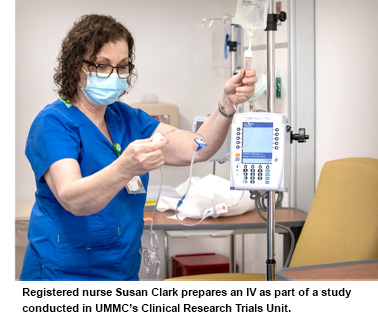On trial: New, better patient care
Good Morning!
The “official” start of summer is still a couple of weeks away, but June 1 marked the beginning of hurricane season, and forecasters are predicting a busier-than-average one. As always, UMMC, led by our Mississippi Center for Emergency Services team, is prepared to provide medical response for any situation in which Mississippians (and others) may be in need.
In the meantime, we stay committed to our three mission areas: education, research and patient care. While each of these have distinct leadership and support teams, they are not separated into silos; all share significant areas of overlap. Today, I want to focus on an area in the Venn diagram where research and health care meet: clinical trials.
 Recently, I checked in with Dr. Richard Summers, our associate vice chancellor for research, and Dr. Whitney Bondurant, our Office of Clinical Trials director, to get an update on what’s happening in this space and what’s ahead. With just a few weeks left in fiscal year 2021, the Medical Center has activated 84 clinical trials. In addition, we have about 50 in the pipeline pending activation and about 50 that we are evaluating for feasibility. We have trials for children and adults covering treatments for cardiovascular diseases, diabetes, gastrointestinal diseases and so much more. We are also preparing trials that test ways to diagnose conditions such as pre-eclampsia and Alzheimer’s disease. The number and diversity of trials we have running or getting ready to start is a testament to our clinical researchers.
Recently, I checked in with Dr. Richard Summers, our associate vice chancellor for research, and Dr. Whitney Bondurant, our Office of Clinical Trials director, to get an update on what’s happening in this space and what’s ahead. With just a few weeks left in fiscal year 2021, the Medical Center has activated 84 clinical trials. In addition, we have about 50 in the pipeline pending activation and about 50 that we are evaluating for feasibility. We have trials for children and adults covering treatments for cardiovascular diseases, diabetes, gastrointestinal diseases and so much more. We are also preparing trials that test ways to diagnose conditions such as pre-eclampsia and Alzheimer’s disease. The number and diversity of trials we have running or getting ready to start is a testament to our clinical researchers.
Human subject trials that prove the efficacy and safety of medical treatments is another in a long list of things that sets us apart from any other medical institution in Mississippi. This program and its continued success is a significant badge of honor for us.
Even though COVID-19 delayed some of our studies, the lessons and skills learned during the pandemic have had some serious benefits for our clinical trials in non-COVID areas. The federal CARES Act has trickled down throughout the organization and has given our research mission area a boost. On average, it took about 21 days – lightning speed in trials-world – to activate COVID-19 trials, and we transferred that speed to other areas. Some of our sponsors took notice of this quickness and efficiency and, now, we are expanding into partnerships with sponsors we’ve not previously worked with or who we haven’t partnered with in a good many years to encompass new trials.
We are very excited to be running more phase 1 trials for anti-cancer drugs. This stage tests a drug’s safety in a small number of people before moving on to larger trials. Started in 2019 by Dr. Shou-Ching Tang and his team at the UMMC Cancer Center and Research Institute, we now have trials involving non-small cell lung cancer and advanced malignant tumors underway. These studies, among others, will be conducted in our Clinical Research and Trial Unit on the seventh floor of University Hospital, as well as spaces like the Pavilion and our offices at the Jackson Medical Mall.
On March 1, we implemented a new electronic clinical trials management system. We’ve already seen greater efficiency and transparency in the nuts-and-bolts administrative aspects than we did with previous systems that were mostly based on paper records. We purchased the system in conjunction with the Mayo Clinic as part of our long-term plan to conduct clinical trials with them. In practice, this means we will be able to have our patients in Mississippi enroll in trials Mayo is conducting in Minnesota, and vice versa. There is a lot more growing out of the UMMC-Mayo Clinic relationship that we will be discussing in the coming weeks. Stay tuned!
One reason our investment in clinical research is so important is because it provides additional treatment options for our patients. For instance, some of our littlest patients – those in the Neonatal Intensive Care Unit – who are enrolled in certain clinical trials receive treatments and care their families otherwise might not be able to afford. Many trial sponsors, particularly pharmaceutical companies, pay for their research volunteers’ medical care.
I want to thank everyone in our clinical research enterprise for the efforts they put into making this program so successful. Your work will help us, now and in the future, build A Healthier Mississippi.



